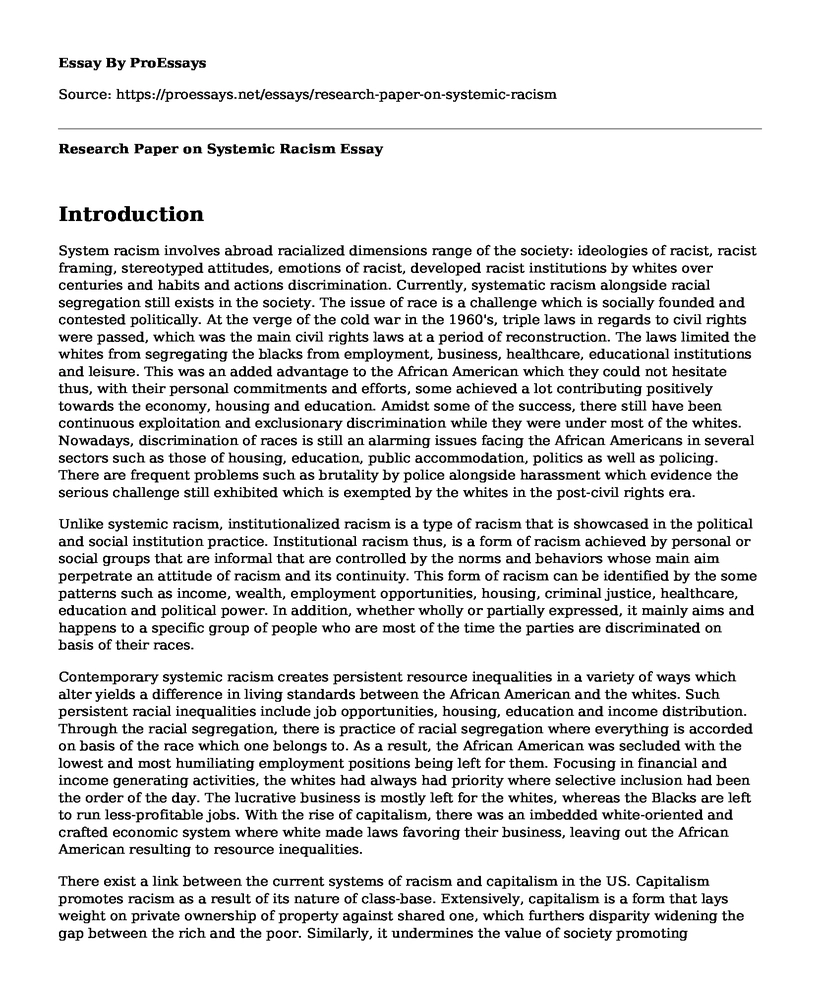Introduction
System racism involves abroad racialized dimensions range of the society: ideologies of racist, racist framing, stereotyped attitudes, emotions of racist, developed racist institutions by whites over centuries and habits and actions discrimination. Currently, systematic racism alongside racial segregation still exists in the society. The issue of race is a challenge which is socially founded and contested politically. At the verge of the cold war in the 1960's, triple laws in regards to civil rights were passed, which was the main civil rights laws at a period of reconstruction. The laws limited the whites from segregating the blacks from employment, business, healthcare, educational institutions and leisure. This was an added advantage to the African American which they could not hesitate thus, with their personal commitments and efforts, some achieved a lot contributing positively towards the economy, housing and education. Amidst some of the success, there still have been continuous exploitation and exclusionary discrimination while they were under most of the whites. Nowadays, discrimination of races is still an alarming issues facing the African Americans in several sectors such as those of housing, education, public accommodation, politics as well as policing. There are frequent problems such as brutality by police alongside harassment which evidence the serious challenge still exhibited which is exempted by the whites in the post-civil rights era.
Unlike systemic racism, institutionalized racism is a type of racism that is showcased in the political and social institution practice. Institutional racism thus, is a form of racism achieved by personal or social groups that are informal that are controlled by the norms and behaviors whose main aim perpetrate an attitude of racism and its continuity. This form of racism can be identified by the some patterns such as income, wealth, employment opportunities, housing, criminal justice, healthcare, education and political power. In addition, whether wholly or partially expressed, it mainly aims and happens to a specific group of people who are most of the time the parties are discriminated on basis of their races.
Contemporary systemic racism creates persistent resource inequalities in a variety of ways which alter yields a difference in living standards between the African American and the whites. Such persistent racial inequalities include job opportunities, housing, education and income distribution. Through the racial segregation, there is practice of racial segregation where everything is accorded on basis of the race which one belongs to. As a result, the African American was secluded with the lowest and most humiliating employment positions being left for them. Focusing in financial and income generating activities, the whites had always had priority where selective inclusion had been the order of the day. The lucrative business is mostly left for the whites, whereas the Blacks are left to run less-profitable jobs. With the rise of capitalism, there was an imbedded white-oriented and crafted economic system where white made laws favoring their business, leaving out the African American resulting to resource inequalities.
There exist a link between the current systems of racism and capitalism in the US. Capitalism promotes racism as a result of its nature of class-base. Extensively, capitalism is a form that lays weight on private ownership of property against shared one, which furthers disparity widening the gap between the rich and the poor. Similarly, it undermines the value of society promoting individualism. Furthermore, the connection between the current systems of racism and capitalism in the US exist because of the less thriving opportunities created by the whites in favor African America.
Feagin describes component of contemporary systemic racism as including: "the complex array of antiblack practices, the unjustly gained political-economic power of whites, the continuing economic and other resource inequalities along racial lines, and the white racist ideologies and attitudes created to maintain and rationalize white privilege and power. Systemic here means that the core racist realities are manifested in each of society's major parts [...] each major part of U.S. society--the economy, politics, education, religion, the family--reflects the fundamental reality of systemic racism." He proved the anti-black racism reality is not only in the U.S but also globally and brings a lot of effects.
Conclusion
Contemporary systemic racism plays a significant role in the impoverishment of the African American at the same time increasing the wealth of the white. This is through the slavery practiced and labor exploitation of the blacks by the whites. Additionally, the creation of a social system in the historical practices that was frequented by the racists economic inequality laid a foundation for the spreading and continuity of racism.
Cite this page
Research Paper on Systemic Racism. (2022, Jun 05). Retrieved from https://proessays.net/essays/research-paper-on-systemic-racism
If you are the original author of this essay and no longer wish to have it published on the ProEssays website, please click below to request its removal:
- Video Games Addiction
- Comparative Analysis "Battle Royal" and "Get Out" Essay
- Reader Response to Maya Angelou's "Momma, The Dentist, and Me".
- Essay Sample on Use of Medication to Treat Alcohol Dependence
- Analytical Essay Sample on Prostitution
- Essay Sample on Volunteer Nurse Gives Back to Community: Homeless Health Education Program
- Essay on Nike's Gender Pay Gap: Lawsuit Implications & Analysis







